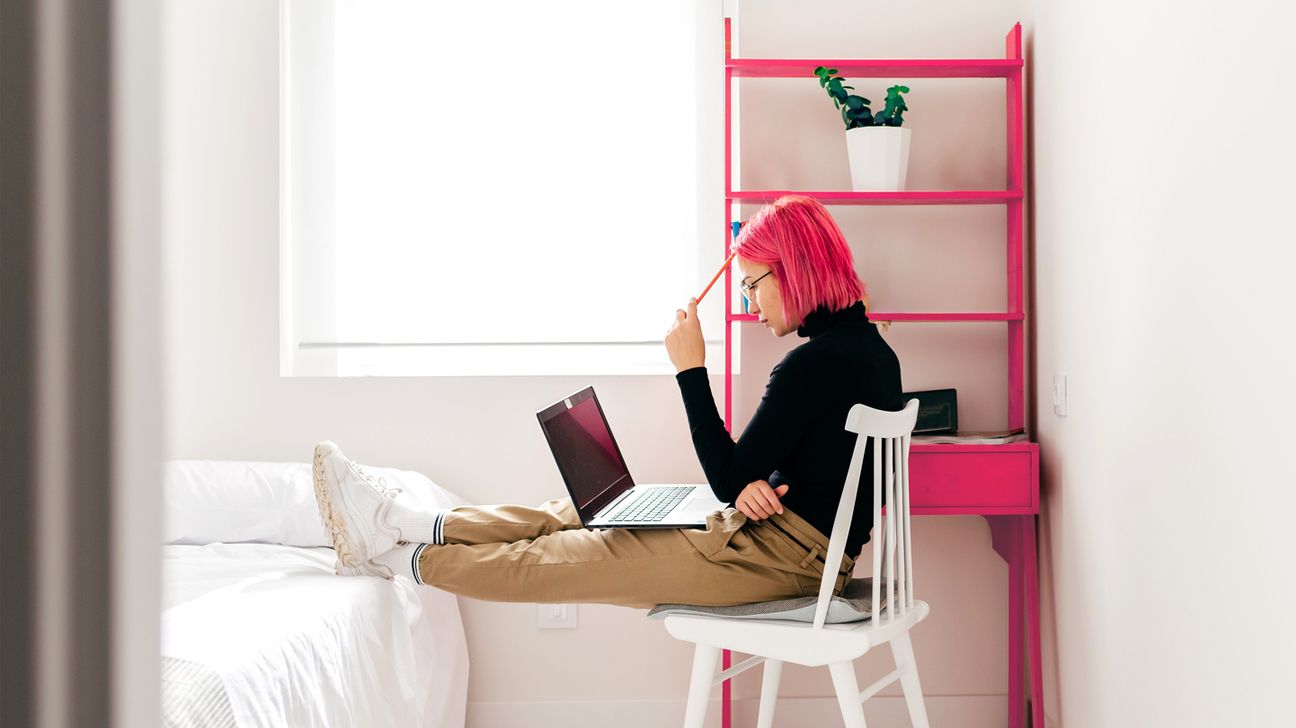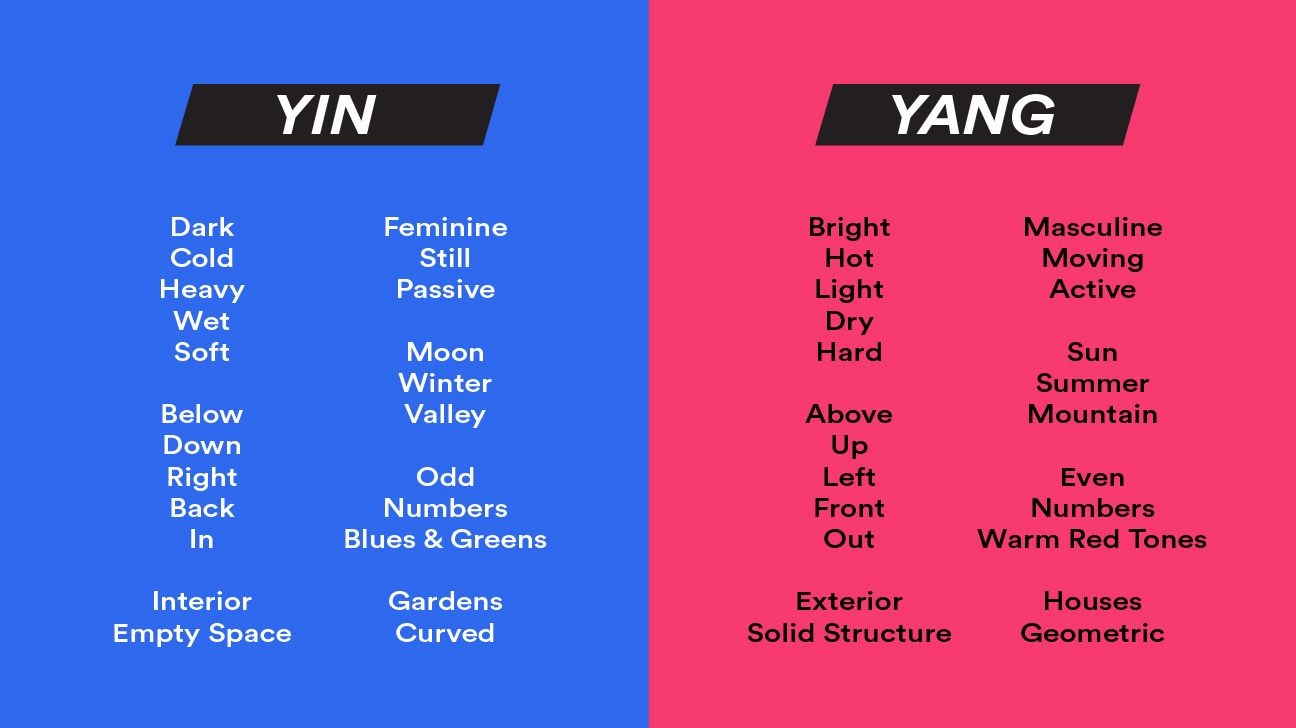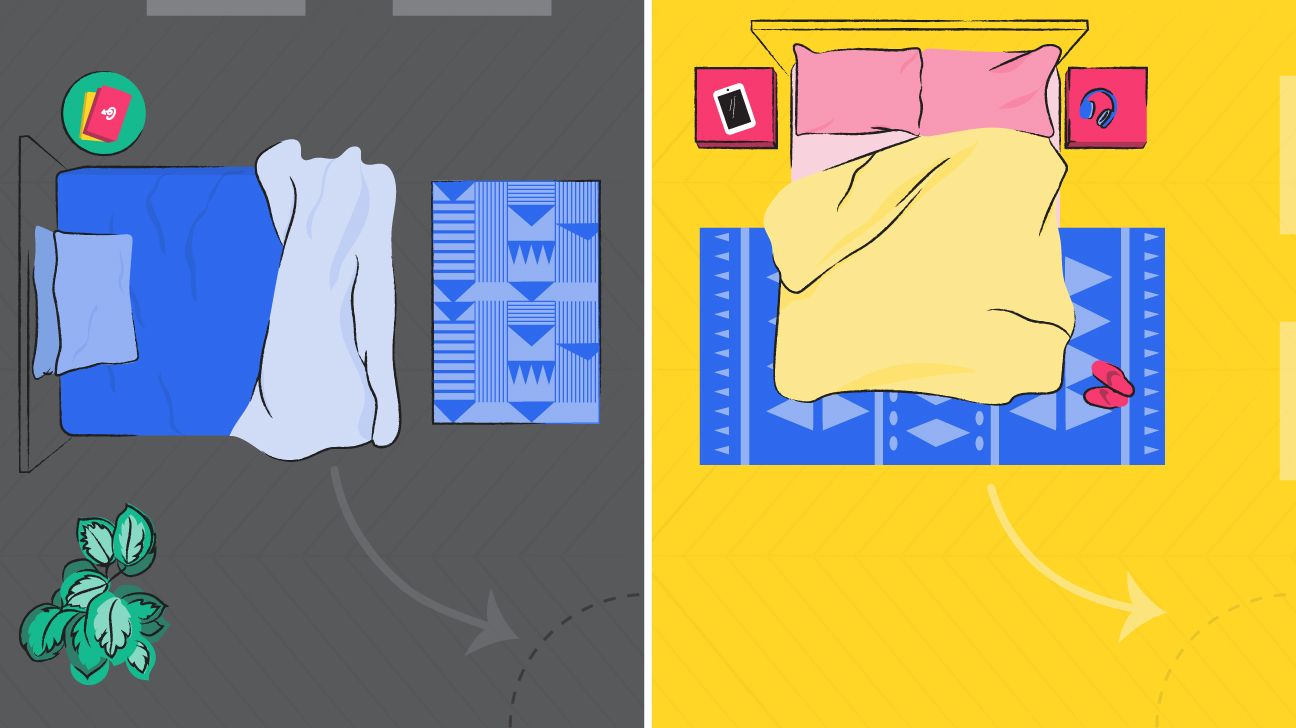My freshman year dorm room was hot, damp, and emitted a mysterious stench. But there was a bigger problem at hand, which my architect mother, well versed in the feng shui practices of her native China, was quick to point out.
With rough cinder block walls, drafty windows, and harsh, fluorescent lights overhead, my “chi” was about to embark on a very tumultuous year. And at $33,538 for tuition, room, and board, that was not going to fly.
I watched and waited as all 5 feet and 1 inch of my mother dragged my desk across the room to face the door (a more commanding position), and moved my bed to the darker, more “yin” side of the room (better for quiet and rest).
What worked in my dorm room years ago continues to serve a purpose today. Now that so many of us are spending time working at home (thanks, COVID-19), a harmonious work/home space is more vital than ever.
Creating balance in the space where you work, live, and play just might be the key to a much-needed boost of productivity and positivity.
So what is feng shui exactly, and how can anyone achieve a sense of harmony without the help of an assertive Chinese architect-mom?
Feng shui (pronounced fung shway) is an ancient Chinese system of balancing our physical environment to promote harmony and a sense of well-being and flow. In fact, its very name, meaning “wind and water,” signifies the two elements of flow.
Feng shui practitioners believe that everything (and everyone) in a living space has a certain energy, or “chi” — from a home’s natural, external surroundings to its furnishings and decor. The theory goes that how we arrange those objects can affect all aspects of our lives.
Using feng shui isn’t just for warm fuzzies (or to accommodate the new rug you scored during a quarantined Amazon shopping blitz).
Practitioners also use feng shui to address specific areas of concern, such as health, wealth, careers, and relationships. You know, like, the stuff most of us care about.
While feng shui may seem mysterious, or even mystical, its guiding principles are quite simple. One key aspect is seeking balance (between yin and yang) despite constant change.
One small study found that bedrooms using principles of feng shui found that sleep quality improved. And the use of feng shui in office environments might make you feel better.
On a practical level, that means there’s an optimal place for every object —bed, books, laptop, even garbage bins.
To kick off our ultimate feng shui guide, we’re starting with the bedroom, where we spend roughly a quarter to a third of our lives.
With the help of feng shui architects and designers, we’ve got your how-to guide on creating a happier, more harmonious room.
It’s “where the magic happens,” and not just in terms of hanky-panky between the sheets. From a feng shui perspective, a properly placed bed is believed to offer security and better sleep (with all its accompanying health benefits).
Feng shui consultant and architect Toshi Kasai says the ideal bed location is diagonally opposite the door — never with your feet pointing directly at the entrance of the room. (In Chinese tradition, the deceased are carried feet first out of the bedroom, and who wants to mimic that?)
When in bed, you should have a clear view of the room and door, and have your head against something solid, preferably a wall. “That’s the most grounding, and you need grounding to sleep,” Kasai says.
Still tossing and turning? Opt for a sturdy headboard to add a greater sense of security, he says.
When space is tight, your bedroom may have to double as your home office — but that doesn’t mean you don’t have flow-friendly options for desk placement.
R.D. Chin, feng shui master and architect, advises positioning the desk in the “power position” of the room — diagonally opposite from the door. This gives a commanding view of the room, allowing you to see your space and think clearly.
Also, avoid having your back to the door (considered too distracting), or against a large window (believed to drain strength).
And while it may be a space saver, most feng shui consultants advise against positioning a desk to face a solid wall, which can negatively affect concentration and creativity.
Desk too close to the bed? Consider investing in a folding screen to block direct views of your sleeping spot. This will also limit reminders of day-to-day stress while in bed. And at all costs, avoid working from bed!
Okay, the bedroom basics and desk design is all fine and dandy, but what if not all of us are so #blessed, and have a combined sleep and work space that’s large enough?
Not a problem. Use the guide below to figure out how to rearrange your space, in relation to your door.
For those double-dwellers, it can be tricky to figure out where to put your clothes and books — let alone a bed, right? Here’s a depiction of the optimal way to rearrange your space, according to feng shui principles.
Ready to call dibs on the best bedroom for light?
Early birds may want to choose east-facing rooms, and night owls, west-facing spaces, Chin says, to boost energy during their preferred times of day. “What we’re trying do is maximize the energy [that comes] direct from nature.”
For rooms lacking natural light, nix the fluorescent lights and consider investing in an incandescent or warm-colored desk lamp and a floor lamp to increase ambient light.
“Light represents yang energy, which promotes feelings of happiness and inspiration,” Chin says.
The first step to a happier home is clearing the clutter — stat! Living in disarray can manifest stagnant or dead energy, Chin says. In a clear and organized space, energy can flow freely. Feelings of guilt and unrest might vanish too, says Kasai.
There’s even scientific evidence for launching an attack on clutter. Studies have linked too much stuff around the house to overeating
And an important note when it comes to love: “If you want to nurture new relationships, now is the time to get rid of those old photographs of ex-boyfriends or girlfriends under the bed,” Kasai says.
No Picassos? No problem. The key to successfully decorating a space is to display only what’s truly meaningful and inspirational to you.
“By using feng shui,” Chin says, “we’re using tools that help people become more conscious about how the space relates to them.”
On the flip side, be sure to take down reminders of negative memories, like unsuccessful projects or failed relationships. These can deplete energy and stir up feelings of inadequacy.
In feng shui, not every household object makes the cut as bedroom material. Electronics big and small — from your iPhone to your treadmill — are thought to emit currents capable of disrupting sleep.
Though there’s not a ton of scientific evidence around electronic currents harming sleep, the idea of keeping devices out of the bedroom isn’t just woo-woo. Research shows that light light exposure can mess with circadian rhythm.
Plus, if your phone reminds you of work stress or your treadmill looms in the corner like a disappointed trainer asking Why haven’t you jogged lately?, you probably don’t want them near your bed.
To summarize, move as many gadgets away from the bedroom as possible, and whatever must remain, keep at a minimum 2 feet from the bed, preferably in the “off” mode.
Even city folks can benefit from a hint of nature in their space. According to Chinese tradition, plants represent growth, prosperity, and good luck.
Looking to grow a business or ace an exam? Try a small bamboo plant on the desk (or any plant or flower with upward pointing energy) for a boost in the right direction.
If serenity’s the goal, opt for rounded over spiky leaves for a more calming effect, Chin says. If you need more ideas, be sure to review our guide for new plant parents.
Hey, gorgeous! Vanity has a time and a place — but, ideally, that’s not in the bedroom. Mirrors are believed to double activity, stirring up more energy than optimal for an area of rest, Kasai says.
The solution: Move floor length mirrors behind the closet door, or at the very least, not facing the bed.
Love race car red? Before dousing a room in it, feng shui experts suggest using your birth date to determine which of the five elements you fall under: wood, fire, earth, metal, or water. (Try a chart like this one.)
“If you’re a fire energy person, green might help balance you,” Chin says. “If you’re a wood energy person, blue might create a more harmonious space.”
In general, yellow and orange can optimize liveliness and cheerfulness, whereas blues and lavender can help soothe stress. And when it comes to overall peace and stability, earth tones may be best.
All chilled out and ready to go? Before applying feng shui from floor to ceiling, remember: It’s not a cure-all for each and every one of life’s challenges.
“Feng shui is not just about placing mirrors and plants,” Chin told me. “It’s much more about using the space as a way to teach us to be more conscious of creating balance in our lives.”
Harmony can come from anywhere, and having an open mind — and a space to call your own — may be the best place to start.




